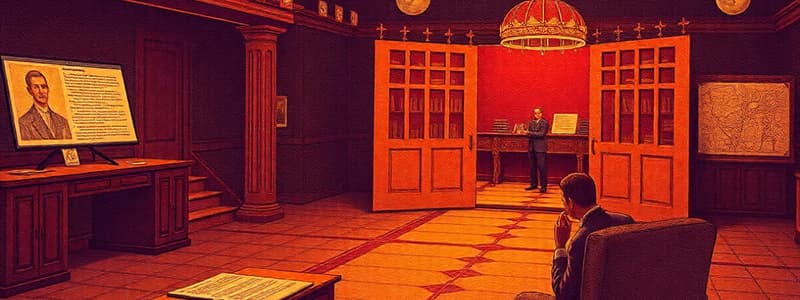Podcast
Questions and Answers
What do psychological factories primarily promote?
What do psychological factories primarily promote?
- Competition among researchers
- Individual achievements and success
- Isolated research practices
- Collaboration and shared resources (correct)
What difficulty does causality pose in the study of psychology's history?
What difficulty does causality pose in the study of psychology's history?
- Now we have sufficient evidence for all events
- Easy identification of causal relationships
- Clear timelines illustrating cause and effect
- Absence of counterfactuals to validate outcomes (correct)
How does bibliometric analysis contribute to the understanding of psychology?
How does bibliometric analysis contribute to the understanding of psychology?
- By isolating individual contributions only
- By subjective evaluations of historical figures
- By focusing solely on qualitative data
- By tracking frequency of terms in literature (correct)
What was a revealed trend in psychological research between 1950 and 1999?
What was a revealed trend in psychological research between 1950 and 1999?
What issue is associated with the diversity of contributions in psychology's history?
What issue is associated with the diversity of contributions in psychology's history?
What does the term 'hero worship' refer to in the context of historical psychology?
What does the term 'hero worship' refer to in the context of historical psychology?
Which of the following best defines the role of collaboration in psychological factories?
Which of the following best defines the role of collaboration in psychological factories?
Why is empirical evidence for psychological history often speculative?
Why is empirical evidence for psychological history often speculative?
Flashcards
Psychological Factories
Psychological Factories
Highly productive research labs that collaborate, mentor, and share resources to produce scholarly articles. These labs emphasize collective success over individual achievements.
Historiography of Psychology
Historiography of Psychology
The study of how the discipline of psychology has developed over time. It examines the evolution of theories, methods, and key figures.
Causality in History
Causality in History
The challenge of identifying the cause of specific events in the past. It is difficult to establish definitive cause-and-effect relationships.
Diversity in History of Psychology
Diversity in History of Psychology
Signup and view all the flashcards
Bibliometric Analysis
Bibliometric Analysis
Signup and view all the flashcards
Evolution of Psychology
Evolution of Psychology
Signup and view all the flashcards
Methodological Core
Methodological Core
Signup and view all the flashcards
Disciplinary Focus
Disciplinary Focus
Signup and view all the flashcards
Study Notes
History of Psychology - Session 1: Introduction
- Course overview: Sessions, materials, and exam details.
- Why study history of psychology?: Understanding origins of ideas, contextualizing current theories, avoiding past mistakes, highlighting evolution, recognizing contributions, appreciating interdisciplinary nature, encouraging critical thinking, and inspiring new research.
- Problems with history: Causality (difficulty discerning cause and effect), values (potential bias of historians), and diversity (underrepresentation of certain groups).
- Historiographic approaches: Methods used to study and understand the history of psychology. Examples of different approaches: biographical approaches, identifying important factors for the development of ideas in the field, and social and cultural influences on psychology.
- Learning outcomes: Gaining knowledge on course details, pros and cons of studying history, understanding historiographic methods, reflecting critically on different approaches, familiarizing yourself with specific topics like the Great Man vs. psychological factors.
- Course materials:
- Slides available from course website.
- ADAM HS2024.
- Vorlesungsverzeichnis.
- Key readings.
- Session schedule: Dates and topics for upcoming sessions. See page 4.
- Exam information: In-person, multiple-choice format and a mock exam will be available in November. Refer to the ADAM forum for assistance and Q&A sessions. The exam date is December 16th.
- Exercise: Write down three events or individuals that significantly shaped psychology (one minute, keep for later).
- Key Figures: Freud, Skinner, Piaget, Eysenck, Bandura, and Rogers among the most cited and important figures in the history of psychology.
- Bibliometric Analysis: A technique for analyzing key terms within scientific journals (e.g., PsycINFO) from 1950 to 1999. Visualizations using co-occurrence maps helps uncover changing trends in psychology over time.
Additional Information
- Agenda: Contains information on course overview, reasons for studying the history of psychology, historiographical approaches, summary.
- Website: Offers access to course materials and session information.
Studying That Suits You
Use AI to generate personalized quizzes and flashcards to suit your learning preferences.
Related Documents
Description
This quiz covers the introductory session of the History of Psychology course. It explores the importance of studying historical perspectives in psychology, potential biases, and various historiographic approaches. Prepare to gain a foundational understanding of how psychology has evolved over time and the contexts that have shaped its development.




